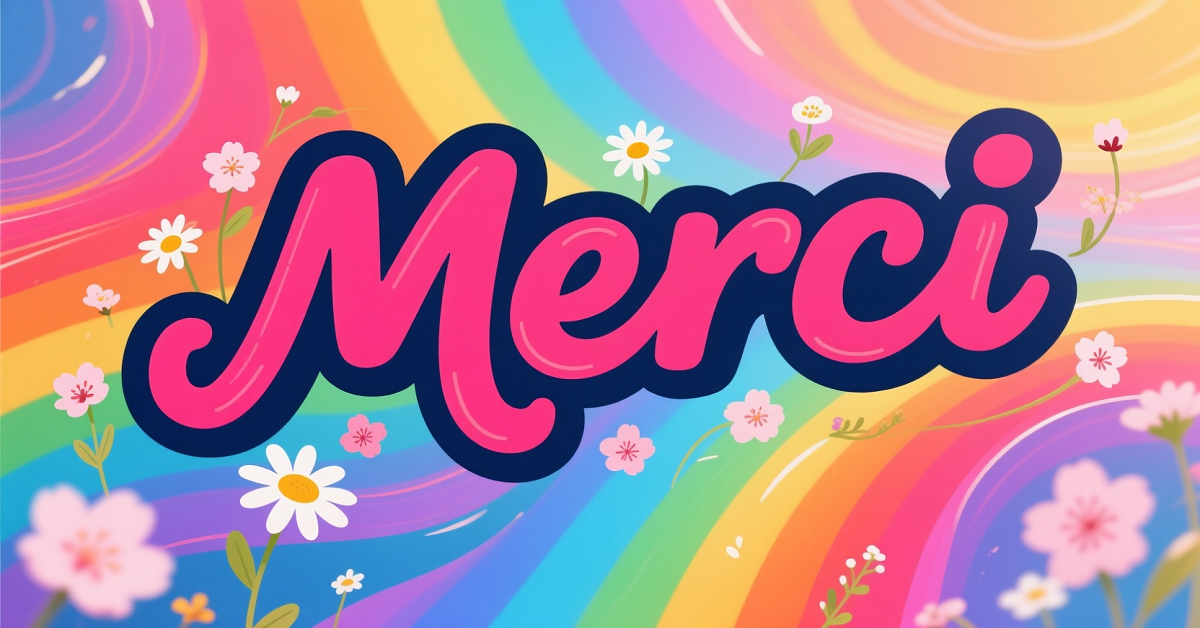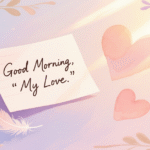Thank you in French is more than just merci it’s a little spark that can turn a simple interaction into a moment worth remembering. Whether you’re strolling through Paris, ordering fresh croissants, or emailing a French colleague, knowing the right way to say it makes you sound thoughtful, confident, and genuinely connected.
And here’s the best part—you don’t have to be fluent to impress. With a few easy but powerful phrases, you can express appreciation in a way that feels warm, natural, and undeniably French. Ready to charm in every “merci” moment? Let’s dive in.
The Everyday Merci Simple, But Never Ordinary
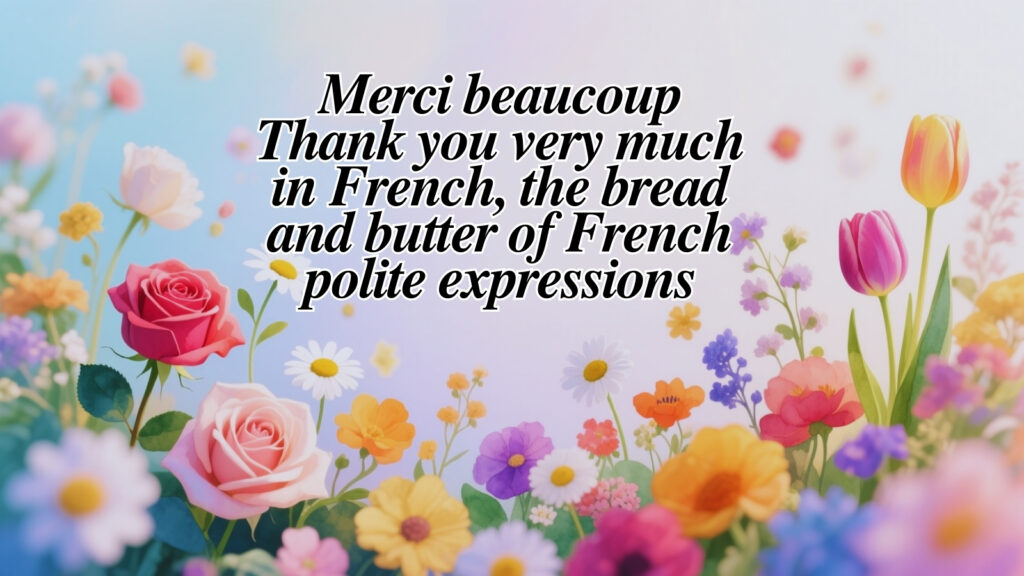
When you’re ordering your coffee, picking up your bread, or catching the metro just in time because someone held the door, the humble merci is your best friend. Don’t underestimate it—sometimes small words carry the most flavour.
- Merci – Plain and perfect for everyday life expressions
- Merci bien – That extra pinch of politeness, like a ribbon on a gift
- Merci beaucoup – Thank you very much in French, the bread and butter of French polite expressions
- Merci infiniment – When you’re deeply grateful, like they just rescued you from speaking bad tourist French all day
- Non merci – A polite refusal, still keeping manners in France intact
- Merci – Your go-to “thank you,” like your favourite scarf—it works with everything.
- Merci bien – A step up; polite, but still friendly, like holding a door for someone.
- Merci beaucoup – The gold standard of “thank you very much in French.”
- Merci infiniment – When you want to sound like you mean it from the soles of your shoes.
- Non merci – Polite refusal without closing the door on kindness.
- Merci mille fois – “Thanks a thousand times,” when one “merci” just won’t cut it.
- Merci du fond du cœur – From the bottom of your heart, croissant crumbs and all.
- Merci encore – “Thanks again,” for when the kindness is worth a repeat.
- Merci d’avance – “Thanks in advance,” perfect when asking for help.
- Grand merci – Short, emphatic, and friendly—works great in casual chats.
- Merci pour tout – “Thanks for everything,” for those who’ve done more than you can count.
- Merci, c’est gentil – “Thanks, that’s kind,” when you want to keep it warm but casual.
- Un énorme merci – An “enormous thanks,” dramatic and fun for friends or family.
Turning Formal Because Sometimes “Vous” is the Hero
In a professional environment or any business setting etiquette situation, a casual “merci” might feel underdressed. Bring out the formal jacket.
- Je vous remercie – Classic and polished; great for emails, official notes, or a respectful greeting
- Je vous suis reconnaissant(e) – “I’m grateful to you,” the grown-up cousin of “merci”
- Merci de votre gentillesse – “Thank you for your kindness” – yes, they’ll probably smile reading it
- Merci pour votre invitation – Perfect after a corporate dinner, so you get invited again
- Votre coopération est précieuse – “Your cooperation is valuable,” the golden phrase for teamwork
When Gratitude Needs to Sound Personal
A friend lends you their bike, bakes you a cake, or helps you move your impossibly heavy couch—skip the generic. Aim for the heart.
- Je t’en suis reconnaissant(e) – The intimate “I’m grateful to you” with the casual tu
- Merci pour le cadeau – Easy but heartfelt; for when they hand you something wrapped
- Merci de ton aide – Because sometimes help is more than help
- Merci pour ton soutien – “Thank you for your support,” deep and warm like a hug
- Merci pour ta gentillesse – Little words that can mean a lot after a rough day
Big Thanks for Big Efforts
Sometimes a regular merci feels like showing up to a party without wine. You need something grand.
- Un grand merci à… – A great thank you to someone, perfect for speeches or public praise
- Merci à toute l’équipe – Because teamwork appreciation is a French thing too
- Félicitations pour votre succès collectif – Congratulating a group while still showing thanks
- Nos efforts combinés ont porté leurs fruits – A poetic nod to collective support
- Votre aide m’a été précieuse – “Your help has been precious to me,” the kind of phrase people remember
Thanking in Cultural Context – The French Way
In French gratitude culture, the when and how matter almost as much as the words. Saying too little can feel cold; saying too much can feel odd. Find the balance.
- Merci pour votre accueil – For when they’ve welcomed you warmly into their home or office
- Merci pour cette magnifique soirée – The host will probably beam
- Merci pour votre hospitalité – Classic, timeless, and universally understood
- Merci de votre patience – Especially handy when your French is slow, and they kindly wait
- Merci de votre compréhension – For those awkward situations where you need a little grace
Playful or Light-Hearted Thank Yous
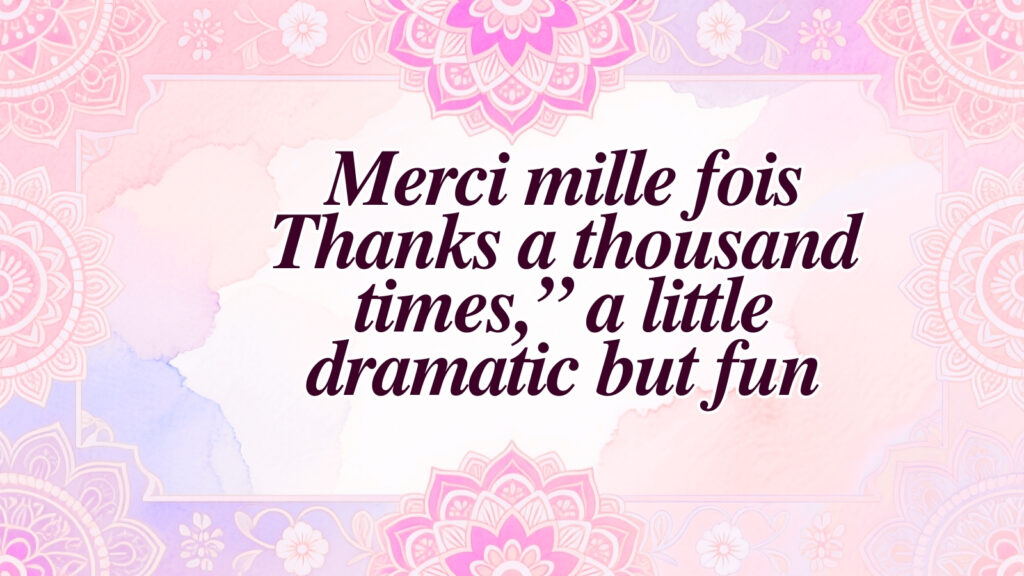
Sometimes gratitude can be cheeky without losing charm.
- Merci mille fois – “Thanks a thousand times,” a little dramatic but fun
- Merci du fond du cœur – From the bottom of my heart (and possibly my croissant too)
- Merci, c’est trop gentil – “Thanks, that’s too kind,” said with a grin
- Merci, tu gères – Casual, “You rock” kind of vibe
- Merci, t’assures grave – Very slangy; your Parisian friends will approve
Expressing Thanks Without Saying “Merci” Directly
Sometimes in French polite expressions, you don’t need the word “merci” at all. The meaning still lands.
- Je ne sais pas comment vous remercier – “I don’t know how to thank you,” which is actually a way of thanking
- C’est vraiment gentil de votre part – “That’s very kind of you”
- Vous m’avez rendu un grand service – For favours big enough to write songs about
- Je suis touché(e) par votre geste – “I’m touched by your gesture,” poetic and warm
- Votre amabilité est remarquable – Polite, formal, and flattering
When You’re Traveling in Paris or Beyond
A dash of French language study and gratitude makes Paris travel even better.
- Merci pour les directions – Because you will get lost at least once
- Merci pour la recommandation – For the restaurant tips that save your trip
- Merci pour la photo – Handy when someone captures your Eiffel Tower moment
- Merci pour la visite – At the end of a guided tour
- Merci pour le service – For waiters, drivers, and anyone making your day smoother
Business Setting Power Phrases
Gratitude in a professional environment isn’t about gushing—it’s about respect and acknowledgment.
- Merci pour votre retour rapide – “Thank you for your prompt reply”
- Merci pour la collaboration – Short and professional
- Je vous suis reconnaissant pour votre expertise – A nod to their skill
- Votre soutien dans ce projet est apprécié – Perfect after a joint task
- Merci pour votre professionnalisme – Always leaves a good impression
Group Gratitude and Public Appreciation
When you’re thanking more than one person—bring in vous and tous to make it inclusive.
- Merci à vous tous – “Thanks to you all,” warm and direct
- Merci à toutes et à tous – The extra polite version, covering everyone
- Nous vous remercions – “We thank you,” formal and collective
- Un grand merci à l’ensemble du groupe – For speeches or public recognition
- Merci pour vos contributions et votre engagement – Highlighting contributions and commitment
Adding Politeness to the Package
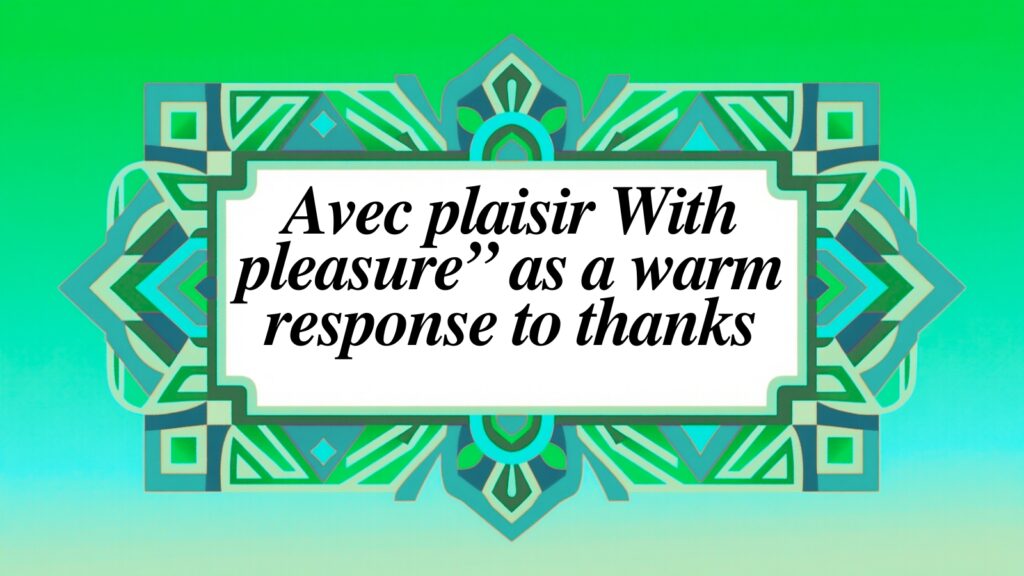
French isn’t just words—it’s rhythm, tone, and subtle French politeness norms. Pair thanks with softeners.
- S’il vous plaît – Please, in the polite form
- S’il te plaît – Casual “please” for friends
- Je vous en prie – The formal “you’re welcome” that feels like silk
- Avec plaisir – “With pleasure” as a warm response to thanks
- C’est normal – “It’s nothing,” a humble reply
Conclusion: Thank you in French
At the end of the day, whether in a café in Lyon, a meeting in Marseille, or a picnic in Bordeaux, the art of remercier is about connection. Words open doors—but warmth keeps them open.
Next time you’re about to say “merci,” pause for half a second. Think about the moment, the person, the context. That’s when gratitude stops being routine and becomes unforgettable.
So, tell me—which of these phrases feels the most “you”? Or maybe you’ve got your own favourite? Share it, or tag someone who needs to sprinkle a little French magic into their thank-yous. Because as the French might say—merci beaucoup, et à bientôt.
If you like, I can also prepare a short, SEO-rich meta description for this article so it’s ready for search engines. Would you like me to do that next?
